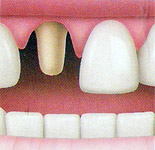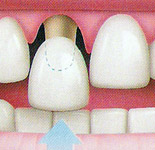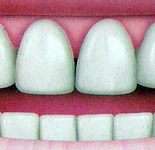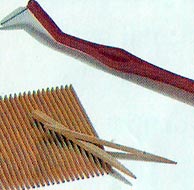|
|
|
|
|
|
|
CROWNS: Restore
Your Smile to Health |
|
 |
What are crowns and why are they used?
A crown is a restoration that covers, or caps, a tooth to restore it
to its normal shape and size. Its purpose is to strengthen 'or improve
the appearance of a tooth. A crown is placed for a number of reasons
to support a large filling when there isn't enough tooth remaining
-
to attach a bridge
-
to protect weak teeth from fracturing
-
to restore fractured teeth
-
to cover badly shaped or discolored teeth
Which material is best?
Both the "look" and function of your crowns are
considered when choosing the materials most suitable for you. Your
dentist will consider the tooth location, the position of the gum
tissue, the amount of tooth that shows when you smile, the color or
shade of the tooth and the function of the tooth.
Crowns are made from a number of materials. Gold alloys or
nonprecious alloys, porcelain or ceramic, acrylic or composite resin
or combinations of these materials may be used. Porcelain attached to
a durable metal shell is commonly used because of its strength. Crowns
made entirely of porcelain may look better; however, they usually
aren't as strong. In the process of making the crown, the porcelain is
colored to blend in with your natural teeth. |
|
|
|
|
|
 |
 |
 |
|
Porcelain fused to metal |
Full
porcelain crown |
Three-quarter gold crown |
|
How is a crown placed?
Several steps are involved in placing a crown. The dentist will prepare
the tooth by removing the outer portion of your tooth to accommodate the
thickness of the crown. If the tooth has a filling, part of the material
may be left in place to serve as a foundation for the crown. An impression
is made to provide an exact model of the prepared tooth. Your dentist or a
dental lab will then make the crown from the model. |
|
|
 |
 |
 |
|
Prepared tooth |
Crown placed over prepared
tooth |
Crown in place |
|
|
|
|
"Temporary" crowns
(often made of acrylic resins) are placed while the permanent crown is
made. If the shape or length of your teeth are changed for cosmetic
purposes, for example, temporary crowns will allow you to become
accustomed to this change. They can also help you decide if you like what
you see or if there are any changes that you would like made before the
permanent crowns are placed.
When the permanent crown is ready, the
dentist puts it in place and makes necessary adjustments. To see how your
crown will look, you can use a large mirror held at arms length in various
types of lighting. When you and your . dentist are satisfied with your
appearance, the crown will be cemented in place. |
|
|
|
|
|

Daily oral hygiene is
essential
|
How do I take care
of my crowns?
Brushing twice a day and cleaning between your teeth with floss or
interdental cleaners (specially shaped brushes and sticks or picks) is
especially important when you have crowns. These measures remove a
sticky film of bacteria called plaque. It is especially important to
remove plaque from the area where the gum meets the tooth (the sulcus).
When plaque accumulates in the sulcus, it can cause dental decay or
gum disease. To prevent damaging or fracturing the crowns, avoid
chewing hard foods, ice or other hard objects. Regular dental checkups
are still required.
What will the
finished crown look like?
One of your dentist's main goals is to create crowns that look like
natural teeth. To achieve this, a number of factors are considered
such as the color, occlusion or "bite," shape and length of both your
natural teeth and of the artificial crown. Anyone of these factors
alone can significantly affect your appearance.
If you have a certain look in mind for your crown, discuss it with
your dentist at your initial visit. When the procedure is complete,
your teeth may not only be .stronger, but they may be one of the most
attractive features of your face - your crowning glory.
|
|

Interdental cleaners
|
|
|
|
|
 |
IF you want your smile to be
your crowning glory, you need
healthy, attractive teeth. When
they are cracked, stained or
damaged, however, your teeth
detract from your dental health
and your appearance" too.
To restore them, your dentist may
recommend crowns. This
brochure will help
answer some of
the common questions you
may have about crowns. |
|
Courtesy
to American Dental Association |
|
|
|
|
Composite
Restorations Implant Over
Denture Metal Free
Ceramics Metal Ceramics
Post and Core |
|
I Dr. Samuel K. Ninan
I Dr. Maya Mathai I
Dr. Shukoor I Basic
flossing
I Treatments I
Doctors
I Facilities I
Consultation
I Contact Us I
Home l |
|
|
|
More information about oral
health visit:
www.pathanamthittadental.com |
|
DENTAL
EMERGENCY Contact: +91 9447440004 |
|
|














